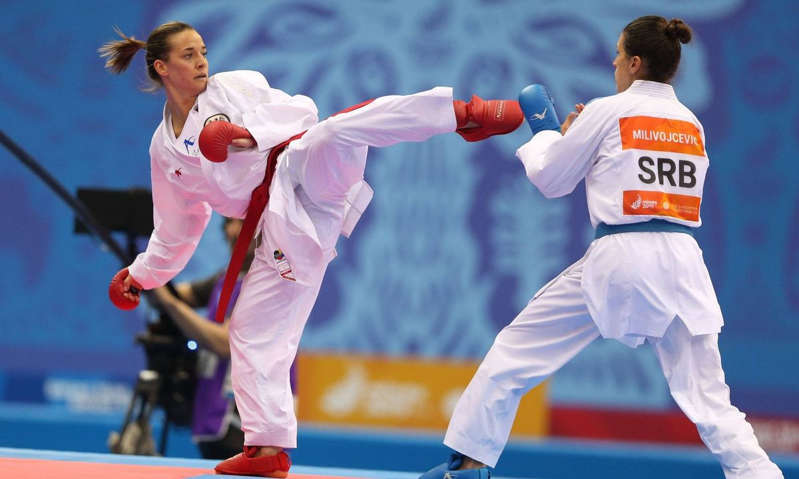
Image: (c) imago images / Schreyer (Schreyer via www.imago-images.de)
As with climbing and skateboarding, Austria will also be represented in karate and thus another new sport under the sign of the five rings. At Bettina Plank's debut on Thursday in the Budokan in Tokyo (10 a.m. CEST), there are two bugs: Plank has to compete in the combined kumite class up to 55 kg and will be one of the lightest of the only ten participants. And karate will be removed from the Olympic program in Paris in 2024,
Plank acclimatized 400 km from Tokyo in Kameoka. The 29-year-old from Vorarlberg was accompanied by trainer Juan Luis Benitez Cardenes, a physiotherapist and a female and a male training partner from Salzburg. “The situation training with my nimble sparring partners was exactly the right thing to do to find safety on the mat,” said the European Games gold medalist from 2019 in her regular class up to 50 kg.
It was also about finding out which tactics can be used to exclude the range advantage of the opponents. “It will be exciting. The difference to judo is that it is not so much about strength aspects, but about the distance. When they are bigger, the arms are longer”, said Plank to the APA – Austria Press Agency. Of course, she was not completely unfamiliar with training with the heavier and taller ones. “In Austria we don't have the luxury of saying we only train with lightweights. This is of course a disadvantage for my own weight class.”
The situation at the Olympics is the same for everyone. It will be about who can handle it better. “It's a new experience for everyone.” Of the ten fighters, six come from class up to 50 and four from class up to 55. She knows one of the latter.
Karate is divided into the disciplines Kumite, in which the winner is determined in a duel, and Kata (form run), in which one alone shows a certain sequence of techniques, in the summer games. In Kumite, everyone fights each against each other in two five-a-side pools in a round robin system, so Plank gets four fights. The first two in each case advance to the semi-finals, there are two bronze medals.
“The goal and the dream would be a medal. Realistically, nobody knows what to expect. They are situations that we have never had before and opponents that we have never met before. It is a totally exceptional situation,” says Plank. Of course, it is a disadvantage that she comes from the 50s class. “But I think it depends on how I handle the situation that day.” This year she has not yet managed to show her performance as she expected. At the moment, I tend to concentrate on myself. And to get what I am able to do. “
It is “tragic” that the Olympics – at least for the time being – will remain a unique experience. “Now we've had the chance to find out what it means to be an Olympic sport. It's madness,” said Plank. “Some things will certainly go less well afterwards. If the rings are behind it, there is an Olympic Committee behind it, which enables you to go down the qualification path. Otherwise an association cannot afford it.”
Nations that weren't so present before would have stomped a team out of nowhere. “The density has grown enormously – countries like Kazakhstan, Uzbekistan, Taipei, Asia in general. And everyone has flown everywhere, there was nothing else left in the qualification.”
If many say that they dreamed of the Olympics as a child, then that does not apply to Plank. “Because karate was not Olympic. As a child I could not understand what Olympic or non-Olympic means. As a child you do the sport that you like to do, that you love, where your heart burns for it. It was the same with me. “
She started when she was nine. “I was a kid who wanted action. Dad suggested it to me because a couple of boys in the neighborhood had already started karate training. It was really good for me from day one.”

